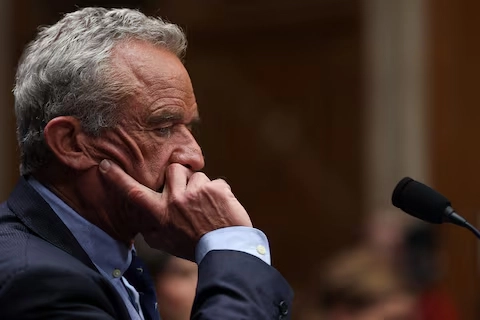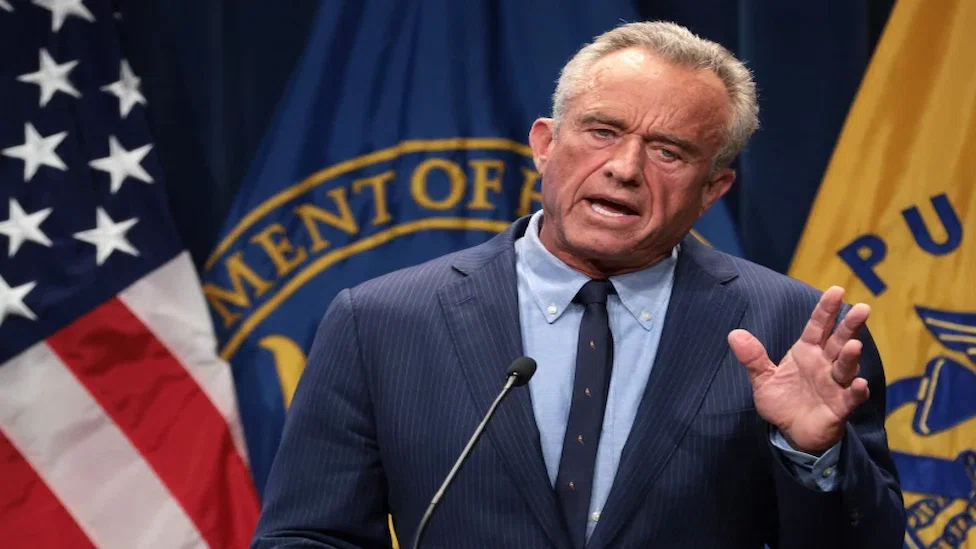RFK Jr. Replaces CDC Vaccine Advisory Panel: Health Secretary RFK Jr. removed all 17 CDC vaccine advisory panel members. Two days later, he named eight new advisers. The move aims to restore public trust in vaccines. The new panel will meet in late June.
Critics fear the appointees may oppose mainstream vaccine policies. Some members have criticized COVID-19 vaccines and lockdowns. Supporters say the change ensures unbiased recommendations. The decision has sparked debate among health experts.
The panel helps shape U.S. vaccine guidelines. Its decisions impact doctors, insurers, and public health policies.
Also Read | Marines Deployment in Los Angeles Sparks Protests and Legal Battle
RFK Jr. Replaces CDC Vaccine Advisory Panel: Insights
- RFK Jr. replaced all 17 CDC vaccine advisory panel members in one move.
- The new members include critics of COVID-19 vaccines and lockdowns.
- Supporters claim the panel will now prioritize “gold-standard science.”
- Critics worry the changes may fuel vaccine hesitancy.
- The panel’s recommendations influence insurance coverage and doctor guidelines.
Background
The CDC vaccine advisory panel helps decide U.S. vaccine policies. It recommends which shots should be given and when. The panel’s choices affect doctors, insurers, and schools. RFK Jr. criticized past members for conflicts of interest.
He promised a more transparent approach. Some new appointees have opposed COVID-19 vaccines. Others have questioned lockdowns. The panel’s decisions can shape public health for years. Past members had expertise in vaccines.
The sudden change worries health advocates. They fear it may weaken trust in vaccines. The next meeting is set for late June 2025.
Main Event
RFK Jr. fired all 17 CDC vaccine advisory panel members on Monday. By Wednesday, June 11, 2025, he announced eight replacements. The new members include Dr. Robert Malone and Martin Kulldorff. Both criticized COVID-19 vaccines and lockdowns.
Kennedy said the new panel will demand stronger safety data. He called them experts in “evidence-based medicine.” Supporters praised the move. Former Trump official David Mansdoerfer called it a “win for medical freedom.”
Critics disagree. UC Law professor Dorit Reiss says the new members lack vaccine expertise. She fears they may push an anti-vaccine agenda.
The panel advises on vaccine schedules, and its choices guide doctors and insurers. Some new members have made controversial claims. Malone falsely said vaccines increase COVID risks. Kulldorff co-authored a letter opposing lockdowns.
One appointee, Dr. Cody Meissner, served on the panel before. Records show he disclosed 12 conflicts of interest. Kennedy had cited such conflicts when firing the old panel.
The new group lacks a voting quorum, and two extra members may need temporary approval. The next meeting is June 25, 2025, to June 27, 2025. The panel’s decisions could shift U.S. vaccine policies.

At a Capitol Hill hearing on May 14, 2025, U.S. Health Secretary Robert F. Kennedy Jr. addresses questions about the HHS budget before the Senate Health Committee.
Photo Credits: REUTERS.
Implications
The shakeup could reshape U.S. vaccine policies. If the new CDC vaccine advisory panel rejects mainstream science, trust in shots may drop. Doctors might face conflicting guidelines, and insurers could change coverage rules.
Vaccine-skeptical groups may gain influence. Parents could question school vaccine mandates. Public health efforts may weaken.
Experts worry about long-term damage. Past panels helped eliminate diseases like polio. A skeptical panel might slow progress. Supporters say the change ensures transparency. They argue past panels ignored safety concerns. The debate will likely grow louder.
Conclusion
RFK Jr.’s CDC vaccine advisory panel overhaul marks a major shift. The new members may challenge vaccine policies. Their decisions could impact public health for years. Experts warn of rising skepticism. Supporters hope for unbiased reviews. The June meeting will reveal the panel’s direction. The debate over vaccines is far from over.



